BBC Verify's five things to watch out for in the election debate
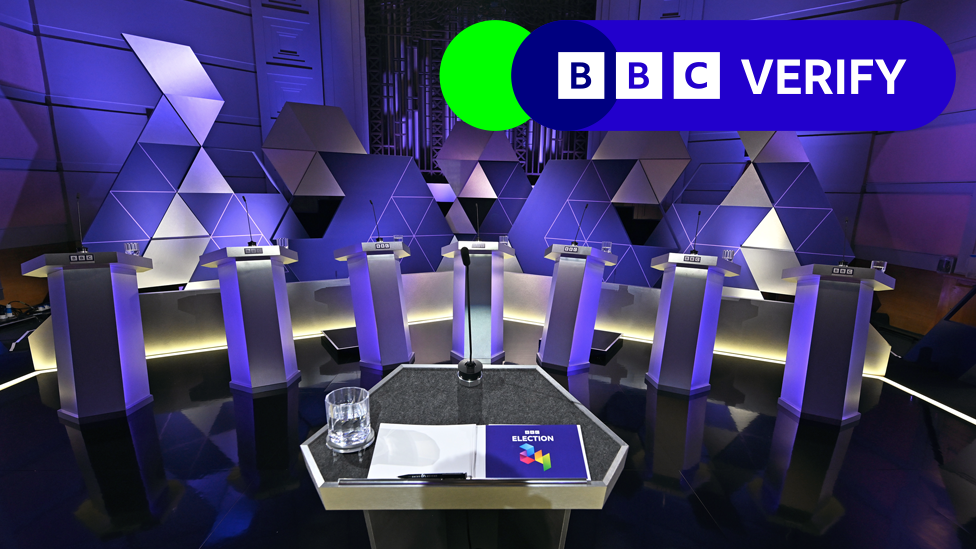
With seven parties debating on Friday night, BBC Verify has looked at claims to watch out for
- Published
The first BBC election debate is under way, featuring the seven biggest parties in Great Britain.
The campaign has already been dominated by claim and counterclaim and it could be a busy night for fact-checkers at BBC Verify.
Here are five of the key topics that might be discussed.
Expect more big claims on tax
The most controversial claims of the campaign so far have revolved around tax. Would Labour or the Conservatives put taxes up after the election?
This week has been dominated by Rishi Sunak’s repeated claim that Labour would increase taxes on working families by £2,000, to plug a gap in its spending plans if it formed the next government.
The claim risks misleading people. A quick summary: it doesn't make it clear that the figure is over four years (so about £500 a year). And while the Conservatives claimed it was a figure from impartial civil servants, there was also involvement from politically appointed special advisers.
But it’s not just the Conservatives who have made claims on tax. Labour have talked about a black hole in Tory spending plans - the highest figure they have claimed is £71bn.
It is also questionable because it assumes the Conservatives will do things in the next Parliament which they have said they will not, such as scrapping National Insurance.
The chancellor says he’d like to do it eventually, but not before 2030 and not unless the economy has grown enough to make it affordable.
When you hear the parties make big claims about the spending plans of their rivals, be cautious. We will not know for sure until they publish their manifestos.
Will we hear about a spending squeeze?
Are the two parties that could form the next government being honest about public spending? That’s a question that some of the smaller parties have been raising.
Here’s why: Labour and the Conservatives have both pledged to bring down debt as a share of the economy - it's currently at levels not seen since the 1960s.
They, and the Liberal Democrats, have pledged not to put up income tax, National Insurance or VAT. Combine that with slow economic growth and it means less money to spend.
That raises the question of which public services will be prioritised and what will happen to other areas.
At the moment, there are areas of protected spending like health and defence. Protecting those budgets means they will have to increase in the coming years to keep up with inflation.
But if their budgets are going up - and public spending as a whole is being squeezed - other departments will lose out.
Independent think tank the Institute for Fiscal Studies reckons some departments could face budget cuts of between 1.9% and 3.5%. They’ve called the situation a “dark cloud” over the election campaign.
Will we get any more clarity tonight?
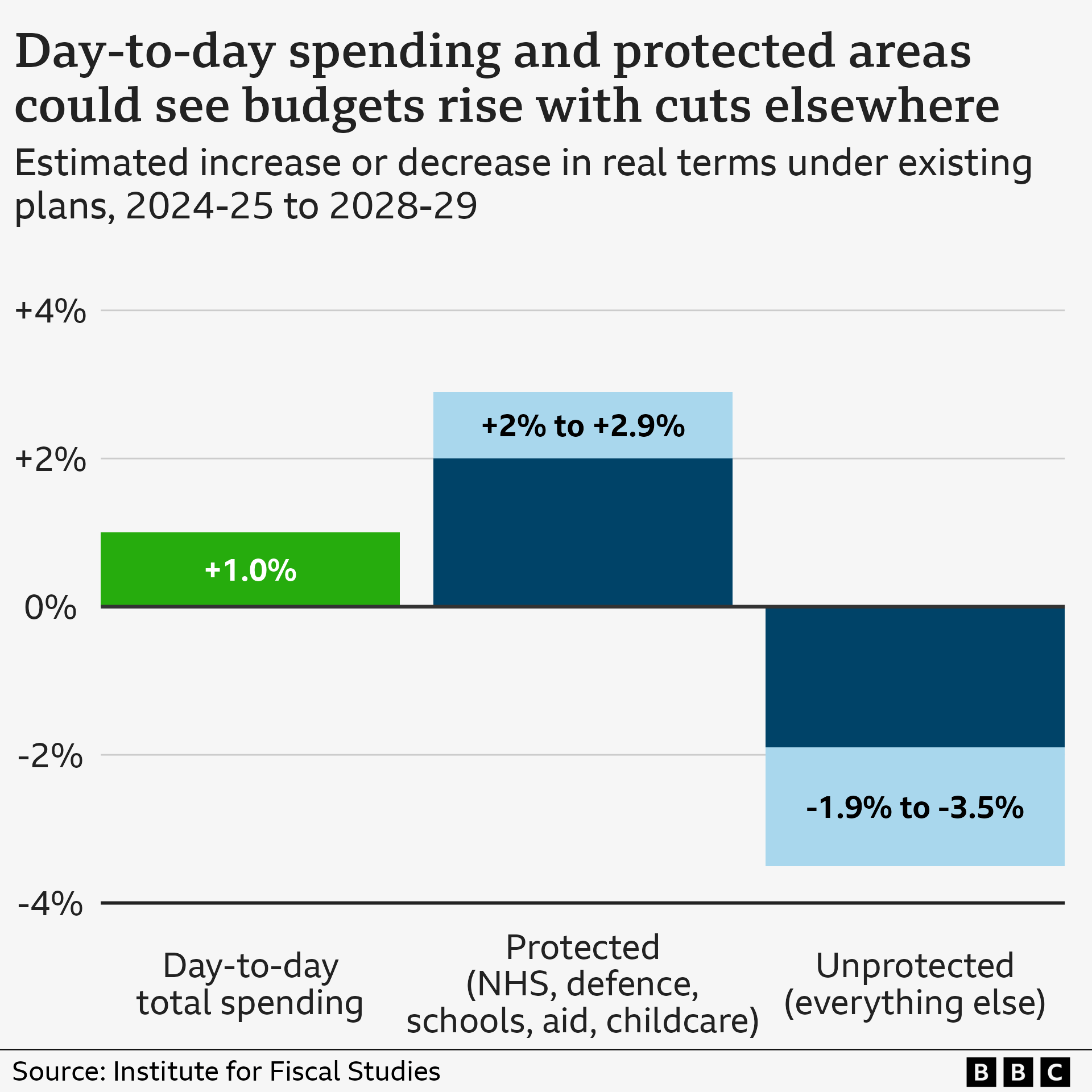
Some will want to talk about immigration
The Conservatives and Labour agree net migration (the total number of people arriving minus the number of people leaving) is too high.
But if immigration comes up tonight, we are likely to hear a broader range of views.
Reform’s Nigel Farage has been one of the most outspoken critics of the government’s handling of immigration.
The SNP, on the other hand, have been more open to immigration and say they want to welcome people to Scotland.
Remember, there are two separate issues here. Legal immigration - and illegal immigration.
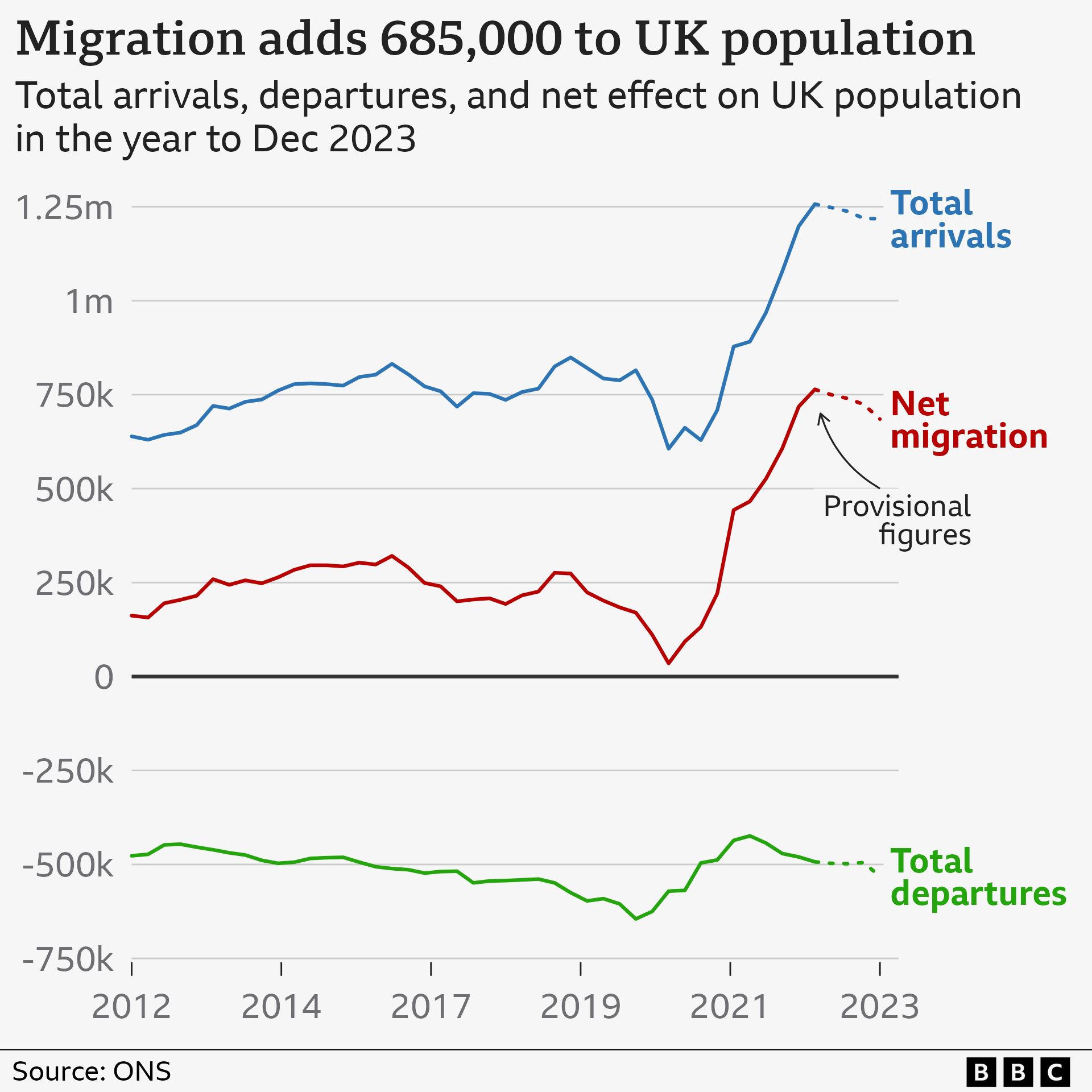
On legal immigration, there is a debate about how many people should be allowed into the UK. As you can see from the graphic above, there’s been a big increase in numbers in recent years. In 2023, net migration stood at 685,000.
Here’s what different parties say about what should happen next:
The Conservatives have suggested a cap (but haven’t put a number on it)
Labour and the Liberal Democrats want to encourage more British people to fill job vacancies in areas with shortages
Reform have said net migration should be zero
Net migration is forecast to come down a lot in the coming years. That’s worth bearing in mind if parties make a pledge to bring levels down.
On illegal immigration, there could be a feisty debate on small boats. Labour opposes the Conservative's Rwanda scheme, which plans to send some people who have arrived illegally to claim asylum in the African country.
Reform UK's Nigel Farage has said the policy is a “charade” in recent weeks.
Some context for the debate: small boat crossings reached a record high in 2022. They fell by a third in 2023. But so far this year, they’re at record levels.
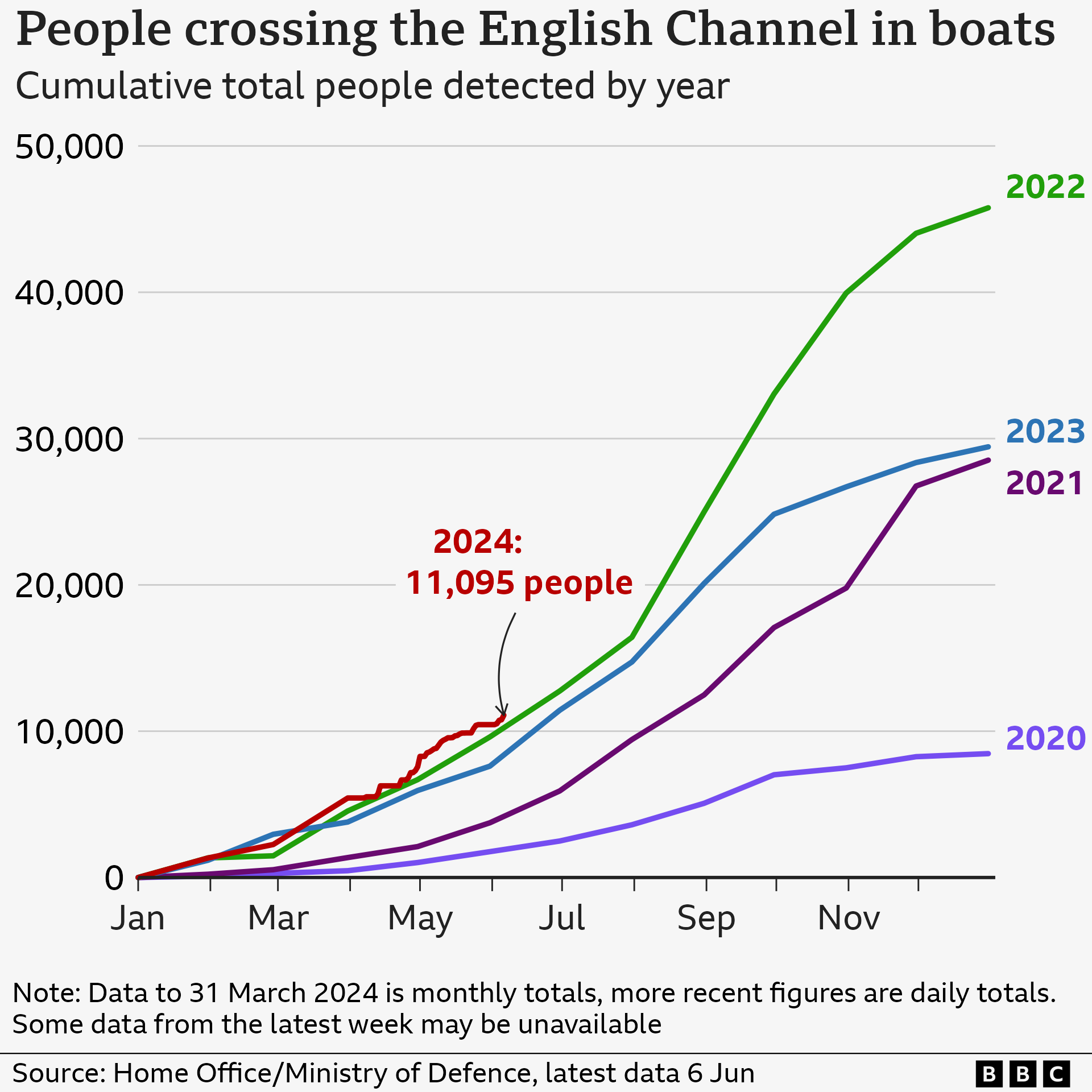
Arguments about health
The Conservatives and Labour have long argued over whether NHS waits for treatment are going up or down. But it depends what time period you're comparing.
The UK government is only responsible for health policy in England, so that is where Conservatives and Labour tend to focus in debates.
Labour often points out that waiting lists are now at 7.5 million, compared with 7.2 million in January 2023 when Mr Sunak pledged to reduce wait times.
Waits peaked at nearly 7.8 million in September last year - but they have since started to fall. This is why the Conservatives say that waiting lists are coming down.
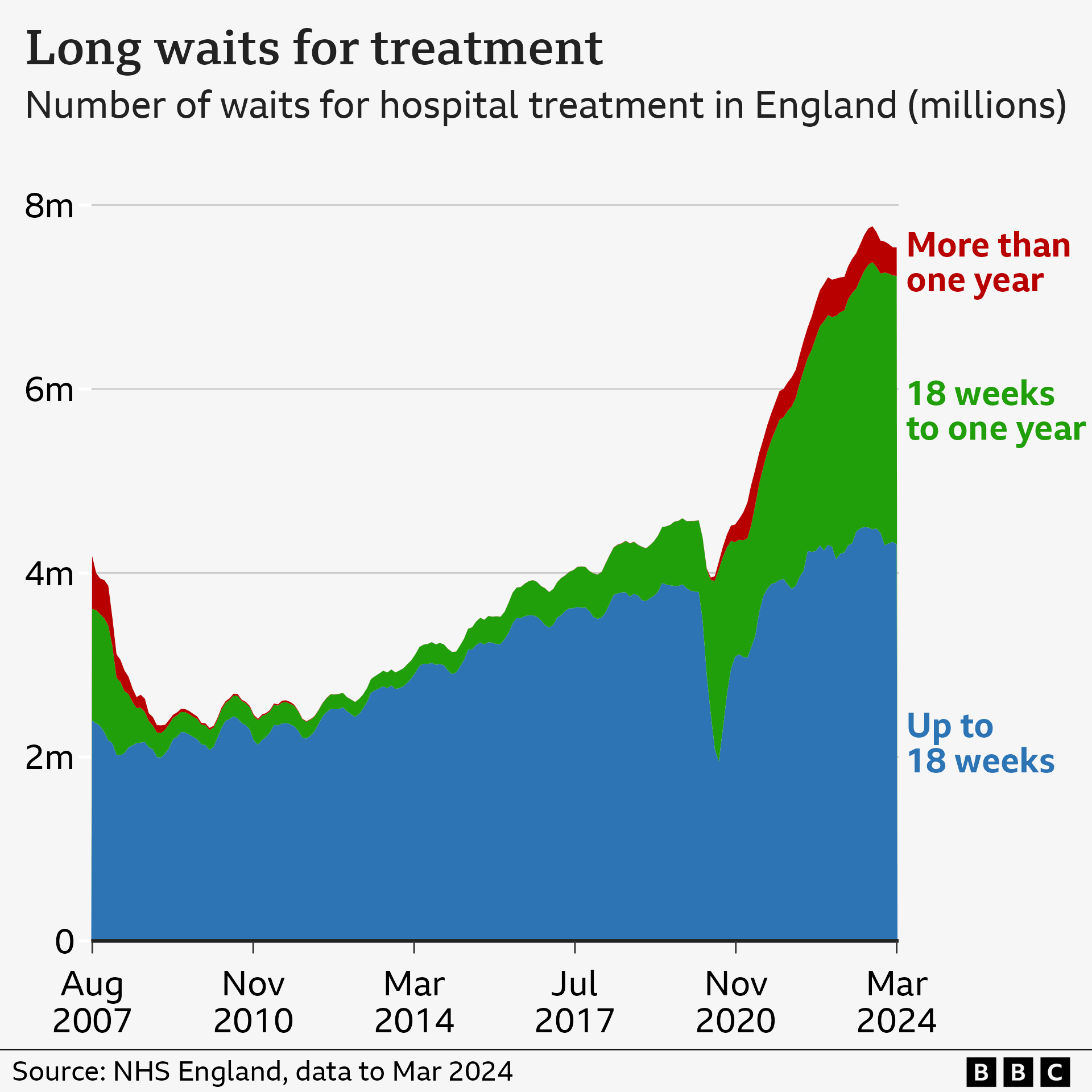
But given the debate features Plaid Cymru and the SNP, the records of NHS Wales and NHS Scotland could also come under the spotlight.
Hospital waiting times in Wales - which is run by Labour - have previously been singled out by Mr Sunak.
On some measurements, the Welsh NHS appears to struggle in comparison with England.
For example, when you look at the average waiting times across NHS England with Wales, there is currently a difference of 46%.
But some experts point out the population in Wales tends to be older, less healthy and more socially deprived, external - which all has an impact on the demand on health and care services.
Also, the Green Party is pledging an extra £50bn a year for health and social care.
What about crime?
Labour have accused the Conservatives of presiding over rising crime rates. The accuracy of this depends on how crime is defined and how it’s measured.
Overall, the most comprehensive statistics – the Crime Survey for England and Wales, external and the Scottish Crime and Justice Survey, external – show a long term downward trend in crime.
But there have been rises in some offences based on numbers recorded by police in England and Wales.
Robbery offences increased by 13% in 2023 compared with the previous year, knife offences were up 7% over the same period and recorded shoplifting offences rose by 37% – the highest figure since current police statistics began in 2003.
Labour have also accused the Conservative government of cuts to neighbourhood police numbers in England and Wales.
The Home Office publishes police workforce statistics, external which show the number of officers in frontline roles was broadly the same in 2023 as in 2010, at around 123,000.
Two caveats: firstly, that number fell to around 106,000 between 2010 and 2016, and then started rising again.
And secondly, the combined populations of England and Wales rose during that time – from 55.7m in 2010 to 60.2m in 2022.


